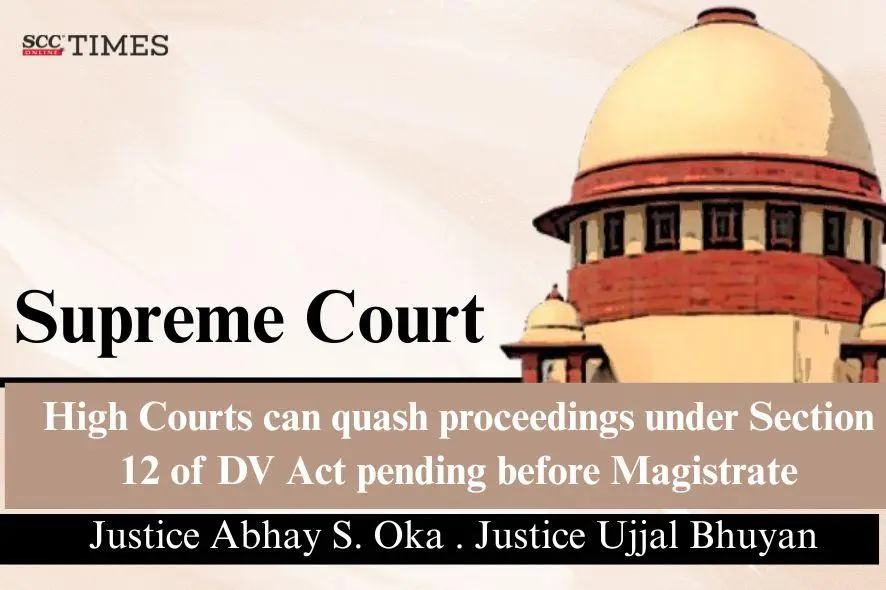Supreme Court: In two connected criminal appeals challenging the common order passed by the Madhya Pradesh High Court which rejected the appellants’ prayer to quash proceedings initiated under Section 12(1) of the Protection of Women from Domestic Violence Act, 2005 (‘DV Act’), the Division Bench of Abhay S. Oka* and Ujjal Bhuyan, JJ., held that High Courts were empowered to exercise their inherent jurisdiction under Section 482 of the Criminal Procedure Code, 1973 (CrPC) or Section 528 of the Bhartiya Nagarik Suraksha Sanhita, 2023 (BNSS) to quash proceedings arising from applications filed under Section 12(1) of the DV Act, 2005, pending before the Court of the Magistrate.
However, the Court cautioned that, considering the beneficial object and purpose of the DV Act, High Courts must exercise such jurisdiction with great caution and circumspection. It reiterated that interference under Section 482 CrPC would be warranted only in cases of gross illegality or manifest injustice.
Accordingly, the Court quashed the impugned order passed by the Madhya Pradesh High Court and restored the petitions to the file of the High Court. The Court directed that the restored petitions be heard afresh and disposed of by the High Court in accordance with the principles laid down in the present judgment.
Issue
Whether the High Court can invoke its inherent jurisdiction under Section 482 of the CrPC (or Section 528 BNSS) to quash proceedings initiated under Section 12 of the Protection of Women from Domestic Violence Act, 2005 (‘DV Act, 2005’).
Analysis and Decision
The Court took note of the provisions of the DV Act and observed that the enactment was intended to provide more effective protection to the rights of women guaranteed under the Constitution, particularly those who were victims of violence occurring within the domestic sphere.
The Court noted that Section 12 of the DV Act enabled an aggrieved person, a Protection Officer, or any other person on behalf of the aggrieved person to make an application to the Magistrate seeking one or more of the reliefs provided under Chapter IV of the Act.
The Court further noted that, as evident from the scheme of the DV Act and particularly Section 12, an application made under the said provision was not to be treated as a complaint under Section 200 CrPC or Section 223 BNSS. It held that, while dealing with a complaint under Section 200 CrPC, a Magistrate could not mechanically take cognizance of the offences alleged therein. The Magistrate was required to examine the complainant and any witnesses to ascertain the truth of the allegations. Only upon satisfaction that a prima facie case existed against the accused, could the Magistrate issue process and take cognizance.
This requirement, the Court observed, also applied to complaints under Section 223 of the BNSS. However, Section 223(2) of the BNSS introduced an additional safeguard by mandating that no cognizance of an offence could be taken by the Magistrate without first affording the accused an opportunity of being heard.
In view of these provisions, the Court reiterated that an application filed under Section 12 of the DV Act could not be equated with a complaint within the meaning of Section 200 of the CrPC or Section 223 of the BNSS. As provided under Sub-section (4) of Section 12, read with Sub-section (1) of Section 13, the normal procedural rule required the issuance of a notice of hearing on such an application. Therefore, the statutory scheme under Section 12 of the DV Act was held to be entirely distinct from that under Section 200 CrPC or Section 223 of the BNSS.
The Court highlighted that, while it was true that the proceedings of an application under Sections 12 and 23 of the DV Act were generally governed by the provisions of CrPC, Sub-section (2) of Section 28 of the DV Act conferred an overriding power upon the Court to lay down its own procedure for the disposal of an application either under Section 12 or under Sub-section (2) of Section 23.
The Court, while examining the issue of jurisdiction to entertain applications under Section 12 of the DV Act, took note of Section 27 of the Act. It observed that the Court of the Judicial Magistrate of the First Class or the Metropolitan Magistrate, as the case may be, had the jurisdiction to entertain such applications. This position was evident from a reading of Sections 12 and 27, when read together with clause (i) of Section 2 of the DV Act.
The Court further noted the existence of Section 26 of the DV Act, which dealt with the power of other Courts, apart from those mentioned in Section 27, to grant reliefs under the Act. It held that, in an appropriate case, where legal proceedings were already pending before a Civil Court or Family Court affecting the aggrieved person, reliefs under Sections 18 to 22 of the DV Act could be sought therein. Similarly, it was permissible to seek such reliefs before a Criminal Court, other than the Judicial Magistrate of the First Class or Metropolitan Magistrate, for instance, in proceedings pending before a Court of Session provided that the proceedings affected the aggrieved person.
However, the Court clarified that Section 26 did not confer jurisdiction on such other Courts to entertain an application under Section 12 of the DV Act. It merely enabled those Courts to grant reliefs under Sections 18 to 22, if the reliefs were sought in pending proceedings affecting the aggrieved person.
The Court emphasised that, “notwithstanding the penal provisions contained in Sections 31 and 33 of Chapter V of the DV Act, the proceedings before the Magistrate under the DV Act were predominantly of a civil nature”.
.
Power of the High Court under Section 482 of the CrPC and Section 528 of the BNSS to quash proceedings under the D.V Act,2005.
The Court stated that, under the scheme of the DV Act, the reliefs provided under Sections 18 to 23 could be granted on the basis of an application made by an aggrieved person, a Protection Officer, or any other person on behalf of the aggrieved person, in accordance with Sub-section (1) of Section 12.
Accordingly, the Court observed that, when the question of quashing proceedings under the DV Act pending before the Magistrate arose, it was essentially a question of quashing an application filed under Section 12(1) of the Act.
The Court clarified that it was examining the issue of the jurisdiction of the High Court under Section 482 of the CrPC or Section 528 of the BNSS, specifically in the context of quashing proceedings initiated based on an application made under Section 12(1). It reiterated its earlier holding that an application under Section 12(1) was entirely distinct from a complaint under Section 200 of the CrPC or Section 223 of the BNSS.
The Court observed that the word ‘Court’ referred to in Section 482 CrPC clearly referred to a Criminal Court within the meaning of Section 6 of the CrPC, which included a Court of a Judicial Magistrate or a Metropolitan Magistrate.
The Court further explained that Section 482 comprised two parts, both of which preserved the inherent powers of the High Court. The first part applied where the High Court exercised its inherent power to make such orders as might be necessary to give effect to any order passed under the CrPC. However, the Court noted that when a notice was issued on an application under Section 12(1) of the DV Act, 2005, the Magistrate did not pass any order under the CrPC. Similarly, when orders granting relief under Sections 18 to 23 of the DV Act were passed, they were also not orders under the CrPC. Therefore, the Court held that the first part of Section 482 was not applicable to proceedings under Section 12(1) of the DV Act.
Turning to the second part of Section 482, the Court noted that it preserved the inherent power of the High Court to prevent the abuse of the process of any Court or to secure the ends of justice. Consequently, in appropriate cases where a Magistrate was dealing with an application under Section 12(1), the High Court could invoke its inherent power under the second part of Section 482 to prevent abuse of process or to secure justice. The Court therefore concluded that the High Court could exercise jurisdiction under Section 482 to quash proceedings arising from an application under Section 12(1), or orders passed under Sections 18 to 23 of the DV Act.
The Court then addressed the scope of interference under Section 482 in matters arising under the DV Act. It emphasised the need to distinguish between proceedings initiated based on an application under Section 12(1), which were predominantly of a civil nature, and proceedings initiated before a Criminal Court for the prosecution of an offence.
The Court observed that setting criminal law in motion carried serious consequences, particularly in relation to an individual’s personal liberty, as a person against whom criminal law was invoked could be subjected to arrest and imprisonment.
The Court clarified that, if a complaint or application was entertained under Section 12(1) of the DV Act, the respondent could not be punished in the manner prescribed under criminal law. Instead, the respondent could be subjected to various civil reliefs as provided under Sections 18 to 23 of the Act. The Court further said that a respondent in such an application could be prosecuted and face criminal consequences only if he committed a breach of a protection order or an interim protection order, as provided under Section 31 of the DV Act. Therefore, the consequences of entertaining an application under Section 12(1) were not as drastic as those resulting from the initiation of formal criminal proceedings. While acknowledging that the orders passed under the DV Act could also be significant or stringent, the Court emphasised that, in proceedings under Section 12(1), a respondent could not be sentenced to imprisonment or fined in the same manner as in a criminal trial.
The Court highlighted that, when it came to the exercise of power under Section 482 CrPC in relation to an application filed under Section 12(1) of the DV Act, the High Court was required to bear in mind that the DV Act was a welfare legislation, specially enacted to provide justice to women suffering from domestic violence and to prevent acts of such violence.
The Court held that, while exercising jurisdiction under Section 482 CrPC for quashing proceedings initiated under Section 12(1) of the DV Act, the High Court should act with great caution and be slow and circumspect. Interference under Section 482 could only be justified in cases of gross illegality or manifest abuse of the process of law. As a general rule, the High Court ought to adopt a hands-off approach when dealing with petitions seeking quashing of applications filed under Section 12(1).
The Court further cautioned that, unless the High Courts exercised restraint in invoking their inherent powers under Section 482 CrPC in such matters, the very object and purpose of enacting the DV Act would stand defeated.
Additionally, the Court noted that, against any order passed by the learned Magistrate under the DV Act, an appeal was specifically provided under Section 29 to the Court of Session. In contrast, it pointed out that, generally, no appeal lies against an order taking cognizance of an offence or issuing process. This distinction, the Court held, was another reason why the High Court should exercise caution when invoking its inherent jurisdiction to quash proceedings under Section 12 of the DV Act.
The Court noted that there were decisions of various High Courts which had taken the view that the jurisdiction under Section 482 CrPC was not available for quashing proceedings arising from an application filed under Section 12(1) of the DV Act. These decisions were primarily based on the premise that the proceedings under Section 12(1) were predominantly of a civil nature. However, the Court held that such a view was not correct, for the reasons already set out earlier in the judgment. It emphasised that the availability of Section 482 CrPC could not be excluded merely on the ground that the nature of the proceedings was civil, particularly when the statutory framework of the DV Act provided for intervention by Criminal Courts and the reliefs sought could have significant consequences.
To conclude, the Court held that the view taken in the impugned order of the High Court, that a petition under Section 482 of the CrPC challenging proceedings emanating from an application under Section 12(1) of DV Act was not maintainable—was not the correct view.
The Court affirmed that High Courts were empowered to exercise their inherent jurisdiction under Section 482 of the CrPC (or Section 528 BNSS) to quash proceedings arising from applications filed under Section 12(1) of the DV Act, 2005, pending before the Court of the Magistrate. However, the Court cautioned that, in light of the beneficial object and purpose of the DV Act, High Courts must exercise such power with great caution and circumspection. It reiterated that interference under Section 482 would be warranted only in cases of gross illegality or manifest injustice.
Accordingly, the Court quashed the impugned order passed by the Madhya Pradesh High Court and restored the said petitions to the file of the High Court. The Court directed that the restored petitions be heard afresh and disposed of by the High Court in accordance with the principles laid down in the present judgment.
CASE DETAILS
|
Citation: Appellants : Respondents : |
Advocates who appeared in this case For Petitioner(s): For Respondent(s): |
CORAM :





